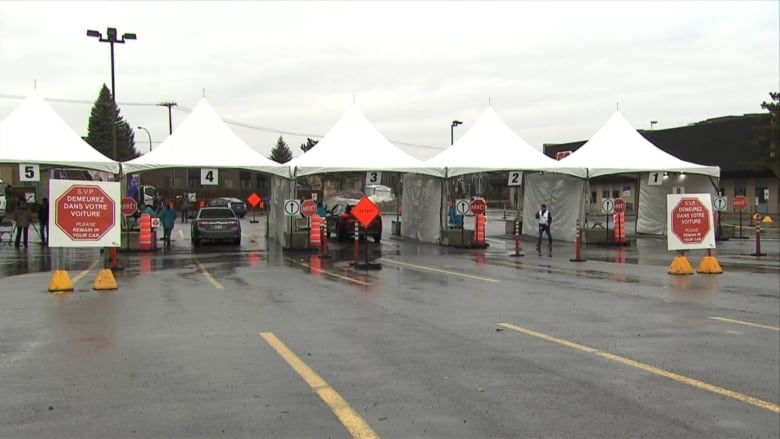More fines, more patrols as Montreal police ramp up enforcement of public health orders
Police are asking Montrealers to report unusual activity, such as parties

Montreal police will begin handing out fines to people and businesses who disobey public health directives aimed at limiting the spread of COVID-19, city officials said Sunday.
Police will also increase patrols in neighbourhoods heavily affected by the virus, and make sure people are helping with public health investigations that trace how the disease is spreading.
If they do not comply with these orders after warnings from police, officers have been told to hand out fines, said Dr. Mylène Drouin, Montreal's top public health official.
Fines will also be handed out to those who do not self-isolate as they await test results. Residents of long-term care homes who do not follow public health directives, such as the ban against visitors, could face fines as well.

The added powers for Montreal police flow from the state of emergency that the City of Montreal invoked on Friday. It was renewed Sunday for another five days.
Montreal police Chief Sylvain Caron said Montreal residents should be on the lookout for "unusual" activities in their communities.
"If there is a situation that is happening close to your home and it is abnormal, [...] like if you hear a gathering with loud music, what we're asking people is to warn us," Caron said at a news conference Sunday.
He said police will also work to support women and children who may be at higher risk of domestic violence if they self-isolate.
Sustained community spread, but numbers stabilizing
As of Saturday night, Montreal had a total of 1,361 confirmed COVID-19 cases, with 93 people hospitalized and 13 of them in intensive care.
Drouin said there are currently six areas on the island with 50 or more confirmed cases. They are Côte Saint-Luc, Côte-des-Neiges—Notre-Dame-de-Grâce, Rosemont–La Petite-Patrie, Plateau-Mont-Royal, Ville-Marie and LaSalle.

But the number of new cases is beginning to rise in some outlying boroughs as well, including Ahuntsic-Cartierville, Montréal-Nord, Rivière-des-Prairies–Pointe-aux-Trembles and Villeray–Saint-Michel–Parc-Extension.
"What this tells us is that, yes, there are more cases in the central area, but the spread and community transmission is sustained and it's all over the island of Montreal," Drouin said.
The good news, she added, is that despite community transmission, the rate of increase in the number of new cases appears to have stabilized over the last few days.
On Sunday, Montreal Mayor Valérie Plante said the city's emergency powers were helping it provide extra care for its homeless population.
Two day centres opened over the weekend to provide food and other social services. The city hopes to open three more, Plante said.
Homeless people who undergo tests will be required to isolate pending the results. If they do test positive, they will be quarantined at the former site of the Royal Victoria Hospital.
So far, three homeless people have tested positive for COVID-19, Drouin said.
New testing site in one of city's 'hot zones'
Earlier on Sunday, a new mobile testing site opened in Côte Saint-Luc. The site will carry out up to 1,000 tests per day in the parking lot of Cavendish mall (5800 Cavendish Boulevard).
The clinic will be open every day from 8:00 a.m. to 8:00 p.m. and the test will be carried out in the car.

A person must have an appointment before arriving at the test centre. Those without a car are encouraged to go to the testing site at Place-des-Festivals instead.
Quebec's director of public health, Dr. Horacio Arruda, said on Friday that Côte Saint-Luc is considered to be among the "hot zones" in the city, along with Côte-des-Neiges, LaSalle and Parc-Extension.
"We're one of the most populated areas in Montreal. People travel. This is not Saguenay you know. The density of the population is very high, and so it's nothing to be so surprised about," said Francine Dupuis, a senior public health official for west-central Montreal.
Dupuis said the health authority also plans on opening a mobile treatment site in the coming weeks for people who are mildly symptomatic.
She said the exact location is yet to be confirmed, but they are looking at a parking lot in the Côte-des-Neiges–Notre-Dame-de-Grâce borough.
With files from Brian Lapuz
